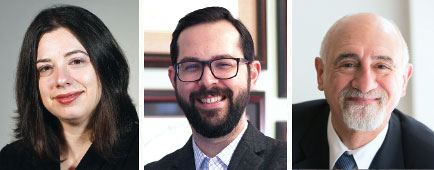Telepsychiatry in the Consultation Setting: Lessons Learned During COVID-19
Abstract
Researchers investigate whether the use of telepsychiatry is appropriate for consultation-liaison psychiatry.
The past two years have brought great challenges to the practice of psychiatry as we have endeavored to provide high-quality care throughout the COVID-19 pandemic. The need to shift from in-person care to remote care has altered practice models. Many clinicians began and continue to provide remote or hybrid care. Even in consultation-liaison psychiatry, in which most patients are on site and potentially unique barriers exist, the need to reduce infection transmission has created an opportunity to investigate ways to adapt.
A September 2020 Psychosomatics article by Christina Shayevitz, M.D., and colleagues, using pre-pandemic data from 557 telepsychiatry consults, investigated the feasibility of utilizing a telepsychiatry hub to improve psychiatric consultation for a multihospital system. The researchers found that although 20% of consults ultimately required a face-to-face evaluation, utilizing this mixed approach decreased the overall average wait time for a psychiatric consultation from less than 24 hours to 92 minutes, systemwide. A June 2020 Psychiatric Annals article by Rachel Caravella, M.D., and colleagues described the transition of a large hospital inpatient liaison service to a comprehensive, functioning, almost exclusively virtual consultation system early in the pandemic. This allowed them to continue serving patients while preserving PPE and limiting risk.
Our group is currently engaging in our third study exploring telepsychiatry in the consultation-liaison psychiatry (C-L) setting. We believe that patient, clinician, and system factors can be identified that will allow the creation of an evidence-based triage algorithm guiding appropriate use of telepsychiatry. In our studies, we predicted that for clinicians, more experience with technology, more training, outpatient work, younger age, younger patient population, and less skepticism would be associated with higher satisfaction with the ability to abruptly adapt to telepsychiatry. We expected that for patients, inpatient status, diagnoses of delirium or dementia, higher age, and non-English language preference would predict more difficulty completing evaluations by a remote platform.
Our first study, published in the November-December 2021 issue of the Journal of the Academy of Consultation-Liaison Psychiatry (JACLP) and led by one of the co-authors of this article (Stephanie G. Cheung, M.D.), looked at 223 logged telepsychiatric C-L encounters from March 2020 to June 2020. The study showed these encounters were acceptable to clinicians in terms of technology (82%) and their ability to form a connection with the patient (78%). In multivariable logistic regression models, an unresolvable difficulty utilizing the platform was less common in sessions with female patients compared with sessions with male patients. Sessions with patients with a non-English language preference were more likely to have unresolvable difficulties with the platform, and it was less likely for the psychiatrist or therapist to report achieving a personal connection.
Our second study, led by another co-author of this article (Adrienne D. Mishkin, M.D., M.P.H., M.S.) and currently in press at JACLP, was a national survey of 333 psychiatrists and psychotherapists. Many respondents are members of the Academy of Consultation-Liaison Psychiatry and the American Psychosocial Oncology Society, allowing us to compare results between C-L (about 60% of respondents) and other psychiatry and psychotherapy clinicians. Survey respondents generally reported good overall satisfaction in the use of telepsychiatry (86%).
We were surprised to find that rates of satisfaction, completion, and patient satisfaction by proxy were not lower in C-L than in the general group. We did find, as we expected, that general technological comfort predicted positive outcomes. Clinician age, contrary to popular belief, did not predict success. We believe that older psychiatrists are active life-long learners who are more likely to have technological ability than their age-matched peers and when necessary can also utilize their great clinical experience to compensate for small technical issues that arise. We were pleased to find that having any training in telepsychiatry was associated with clinicians reporting they were more able to complete evaluations. This brings us hope that hospitals and medical systems choosing to invest in training programs can expect return on this investment of resources and time.
We found several factors that predicted worse outcomes, where outcomes were defined as (a) whether clinicians could get their work done, (b) whether clinicians were overall satisfied, and (c) whether patients expressed satisfaction with the remote modality. Patient population factors included gender and sexual minority patients and inpatients (the vast majority of whom were medical inpatients). Physician and therapist factors predicting worse outcomes were male gender, being skeptical about using telepsychiatry, and being less comfortable with technology in general. Physicians were less likely than nonphysician therapists to report their patients were satisfied with this model. C-L psychiatrists had similar responses in general, with the only significant difference being that tele-C-L was more dependent on floor staff assistance.
We are now working on a thematic coded analysis to identify nuance and patterns in the free-text answers and comments collected throughout in the survey. Of 333 respondents, 316 left detailed comments and free-text answers about the best or worst parts of working remotely during the pandemic. Though many refer to common issues like internet signal, some of these written responses are leading us to think in new ways about whether interactions occurring from the patient’s home environment can reveal previously unknown information. Are boundaries and frame irrevocably altered by the changed setting? How does remote work impact on the clinician’s life in terms of privacy, dependent-care responsibilities, and work/life balance? We look forward to sharing these additional data soon. ■
The journal Psychosomatics is now the Journal of the Academy of Consultation-Liaison Psychiatry.
“Implementation of a Centralized Telepsychiatry Consult Service in a Multi-Hospital Metropolitan Health Care System: Challenges and Opportunities” is posted here.
“Development of a Virtual Consultation-Liaison Psychiatry Service: A Multifaceted Transformation” is posted here.
“Pilot Assessment of Patient and Provider Characteristics Associated With Satisfactory Consultation-Liaison Telepsychiatry Encounters” is posted here.




